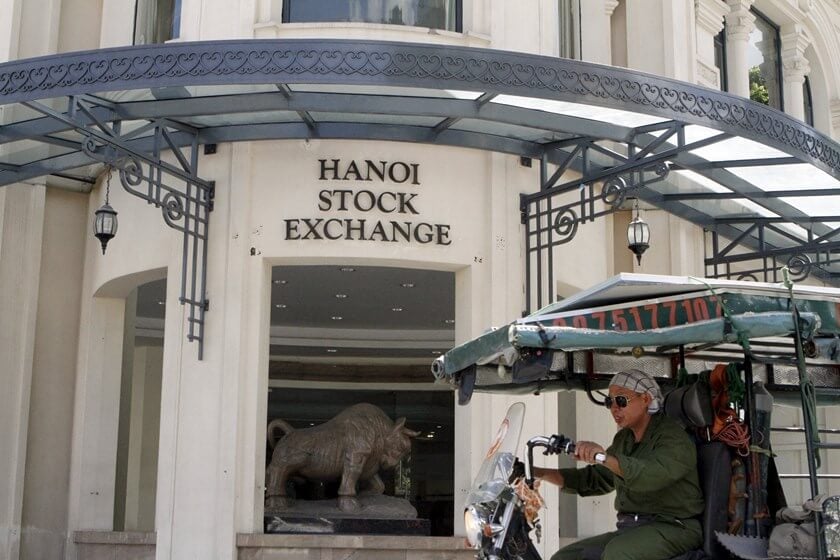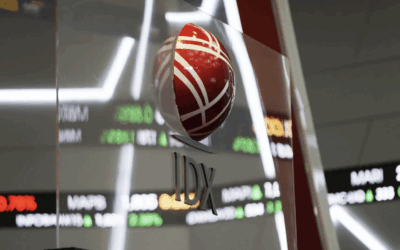Vietnamese stocks have been on foreign investors’ radar for quite some time.
The main question is: what’s the best way to access the market? It’s not like you can trade stocks in Vietnam, or any other frontier market, through a standard brokerage account.
Either way, the long-term investment case for stocks in Vietnam in clear. That’s partially because of the nation’s similarities to China in the 1980s and 1990s during its earlier stage of economic growth.
Vietnam ETFs have also soared in popularity and value, as the nation largely shrugged off the rest of the world’s economic problems over the past few years.
However, foreigners rarely buy individual stocks in Vietnam since accessing the market is rather difficult.
Notoriously heavy amounts of bureaucracy, combined with lack of available market info outside the local language, have held Vietnam’s equity markets back more than anything.
That said, authorities are taking steps to fix these issues. Banks are becoming friendlier to foreign investors (and even non-residents) in Vietnam while the government is simplifying its regulations as time goes by.
Vietnam is, by all means, on the right path. The Ho Chi Minh Stock Exchange removed all restrictions on foreign ownership. The nation’s government is in the process of privatizing a huge number of state owned business too.
The websites of many stock brokers and government departments are able to be browsed in English. Yet their quality is poor and the vast majority of analysis is in Vietnamese only.
Still, Vietnam’s stock market has seen significant improvement in terms of its accessibility over the past decade. Recent changes make it easier for foreigners to invest in Vietnam than ever before.
And keep in mind that, for many foreign investors, buying stocks is the most viable option because you can’t own freehold real estate in Vietnam.
Stock Exchanges in Vietnam
Vietnam is unique among other countries in Southeast Asia since they host not one, but two major stock exchanges. The Ho Chi Minh Stock Exchange (HOSE) operates alongside the smaller Hanoi Stock Exchange (HNX).
Back in 2020, Vietnam merged the two exchanges into one platform called the Vietnam Stock Exchange. All stocks listed in Hanoi were transferred to the HOSE which serves as Vietnam’s sole stock exchange.
The HNX nonetheless continues operating as Vietnam’s main bond exchange, and offers mutual funds, derivatives, ETFs, and plenty of other investment options as well.
With the merger complete, you’re able to purchase over 700 different stocks on the Vietnam Stock Exchange. That’s a massive amount of choice for a frontier market!
Ho Chi Minh Stock Exchange (HOSE)
- Vietnam’s largest stock exchange
- Market capitalization of around US$225 billion
- Total listed stocks: More than 700
- Trading hours: 9AM to 3PM with a break from 11:30AM to 1PM
- Serves as Vietnam’s sole equity exchange from 2020 onward

Despite Vietnam’s status as frontier market, its two large exchanges offer a variety of options. You’ll have a greater amount of choice compared to elsewhere in Asia at a similar level of development to Vietnam.
Hanoi Stock Exchange (HNX)
- Vietnam’s second biggest stock exchange, and its main bond exchange.
- Market capitalization of around US$50 billion
- Currently holds about US$200 million worth of bonds.
- Trading hours: 9AM to 3PM with a break from 11:30AM to 1PM
- Serves as Vietnam’s largest bond exchange
How to Buy Stocks in Vietnam
Foreigners can invest in both of Vietnam’s two major exchanges through the Vietnam Stock Exchange platform.
To buy stocks in Vietnam directly, you’ll need to open a brokerage account in Asia if you don’t already have one.
Besides that, several Vietnam ETFs are traded outside the country.
The two largest ones are Vietnam Enterprise Investments Limited (LON:VEIL) which is traded in the United Kingdom, and Vaneck Vectors Vietnam (NYSEARCA:VNM) in the United States.
These will provide broad access to the overall market, but in recent years, they’ve both underperformed large caps. You might be better off buying a basket of the ten largest companies in Vietnam… if you can open the right brokerage account and trade directly.
While there are several limitations regarding foreign majority holdings, this shouldn’t become a factor for all except the wealthiest of personal or institutional investors.
Find a Stock Broker in Vietnam
Getting a brokerage account is a requirement for you to start buying Vietnamese stocks individually.
With language barriers still a problem here, its usually better to open an account at one of Vietnam’s largest brokerage firms.
Otherwise, a few very specific brokerages in Singapore nearby provide access to emerging and frontier markets which include Vietnam.
Vietnam’s biggest stock brokers are more likely to have someone on hand who can speak English if you visit a branch in the central business district. Such firms are generally more competent when compared to smaller ones as well.
Below are the five largest brokerage companies in Vietnam by market share:
- Saigon Securities Incorporation
- Ho Chi Minh City Securities Corporation
- Viet Capital Securities Joint Stock Company
- Vndirect Securities Corporation
- ACB Securities Company Ltd.
Get a Vietnam Brokerage Account
Once you have selected a brokerage firm, they will ask for a number of documents to be filled out. The exact types vary based on the brokerage but generally include:
- Account Opening Application
- Power of Attorney
- Securities Trading Code Application
- Copy of Your Passport
- For US Citizens, Documentation for FATCA Compliance
Open a Bank Account in Vietnam
The stock brokerage company should also be able to help you open a bank account in Vietnam with one of their partners in order to hold funds and settle global transactions.
It requires filling out another form or two (or three). But during the account opening process, the brokerage can reuse many of the same documents from the last step.
Apply for a Trading Code
With everything else finished, the brokerage will apply for your securities trading code. This is essentially an ID for investors and a requirement for trading stocks in Vietnam.
That will of course require a notarized passport copy, but you should have already submitted that for Steps 2 and 3 further above.
After getting a securities trading code, you’re officially done! Just transfer money to your new brokerage account, start trading, and join in on Vietnam’s economic growth.
Are Vietnam Stocks a Good Investment?
Vietnam stocks can potentially be a good investment, as the country stands to benefit from China’s economic slowdown and the relocation of manufacturing supply chains.
In particular, Vietnam offers a cheaper and easier business environment compared to alternatives, especially in the manufacturing sector, which is why major companies like Samsung and LEGO have moved operations there.
Vietnam’s advantages lie in its lower costs, strategic location, and strong demographics. The country boasts one of the highest export growth rates globally, driven by a skilled and inexpensive workforce, cheap electricity/materials, and business-friendly regulations.
Sharing a border with China also makes it more convenient for companies to shift supply chains.
However, investing in Vietnam does come with challenges. The stock market is difficult for foreigners to access directly due to heavy bureaucracy and lack of information.
Our verdict is: Vietnam’s strong fundamentals and growth potential make it an attractive destination for investors, particularly in the manufacturing sector.
But above all, it’s important to weigh the opportunities against the regulatory hurdles and market access issues. As with any frontier market, a long-term mindset and risk tolerance are essential.
Trading Stocks in Vietnam: FAQs
Can Foreigners Buy Stocks in Vietnam?
Yes, foreigners can invest in both of Vietnam's two major stock exchanges - the Ho Chi Minh Stock Exchange (HOSE) and the smaller Hanoi Stock Exchange (HNX). Vietnam removed all restrictions on foreign ownership of stocks.
However, you'll generally need to either open a local brokerage account in Vietnam or trade through an account based in a nearby financial hub like Singapore, as brokerages in the US or Europe typically won't provide access to Vietnamese stocks directly.
What Vietnam ETFs are the Largest?
The two biggest Vietnam ETFs are Vietnam Enterprise Investments Limited (LON:VEIL) which is traded in the United Kingdom, and Vaneck Vectors Vietnam (NYSEARCA:VNM) in the United States.
These ETFs offer broad exposure to Vietnamese equities. However, investing in individual stocks, especially small and mid-cap companies, is preferable to ETFs for more direct and cost-effective access to Vietnam's market if you're willing to put in the research effort.
What is Vietnam's Biggest Company?
Vietnam's largest company by market capitalization is Vingroup, a conglomerate involved in real estate development, retail, healthcare, education and automobiles. As of 2024, Vingroup's market cap exceeds US$15 billion.
Other major Vietnamese companies include Vinhomes (real estate), Hoa Phat Group (steel), Vietcombank, Vinamilk (dairy), and FPT Corporation (IT services).







